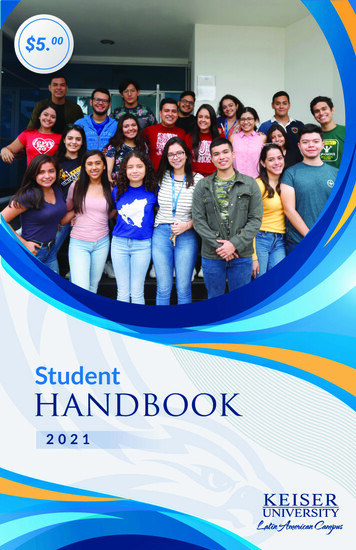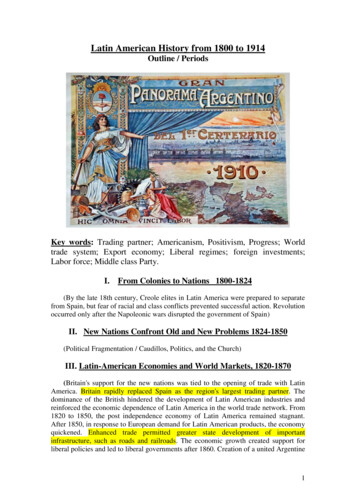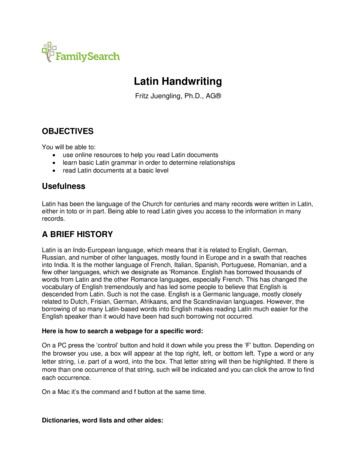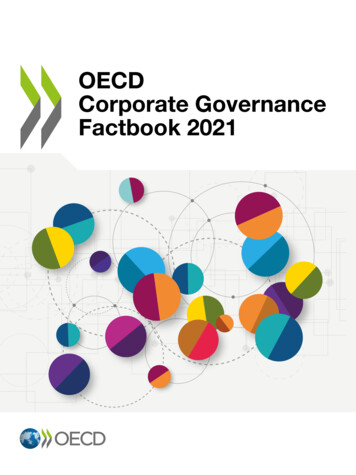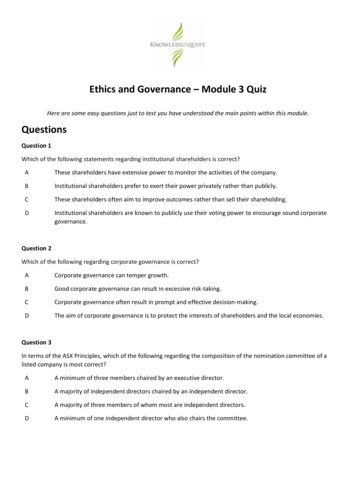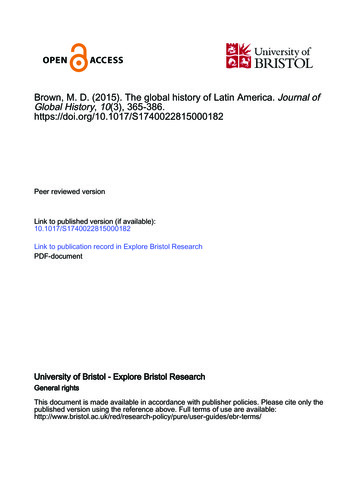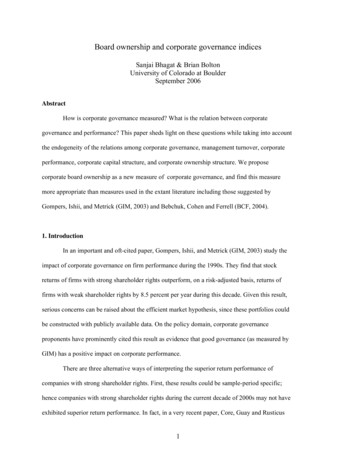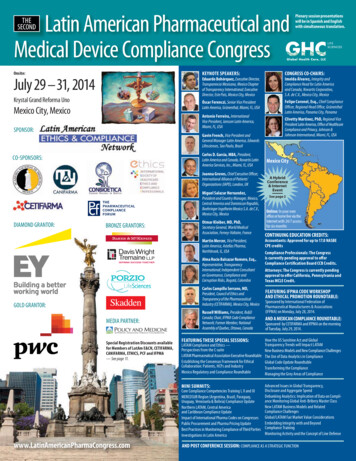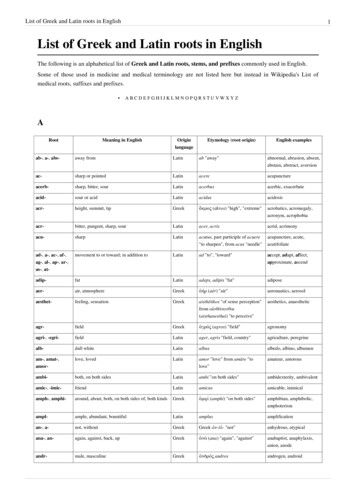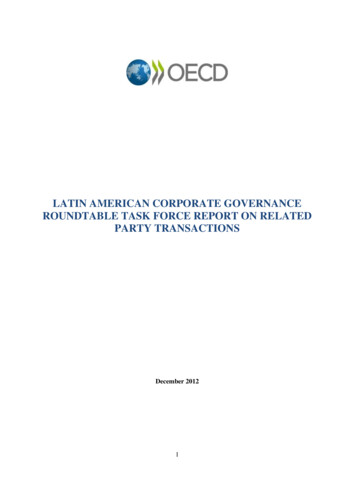
Transcription
LATIN AMERICAN CORPORATE GOVERNANCEROUNDTABLE TASK FORCE REPORT ON RELATEDPARTY TRANSACTIONSDecember 20121
AcknowledgementsThis report was prepared for the Latin American Roundtable Task Force on Related Party Transactions andwas principally drafted by the Task Force’s reporter, Mike Lubrano, with oversight by Daniel Blume of theOECD Secretariat. The country chapters draw from information provided by country level task forces fromArgentina, Brazil, Chile, Colombia, Mexico and Peru, taking into account other relevant research on thistopic, including OECD reports and information gathered in connection with the preparation in 2011 of theLatin American Corporate Governance Roundtable Survey Report on Related Party Transactions.The OECD wishes to thank the following members of the Task Force for their contributions to this work: Argentina: Ms. Maria Luisa Streb, Patricia Boedo and Robert Britos of the National SecuritiesCommission (Comision Nacional de Valores - CNV); Maria Jose Van Morlegan, formerly of theArgentina Social Security Administration (Administración Nacional de la Seguridad Social ANSES); Silvina Vatnick of the Center for Financial Stability (Centro de Estabilidad Financiera– CEF); Arturo Giovenco of Estudio Giovenco; and Eduardo Bacque and Marcelo Kozack of theChamber of Companies (Cámara de Sociedades Anónimas - CSA). Brazil: Otavio Yazbek, Luciana Dias, Eduardo Maia Jr., Frederico Shu, Uwe Kehl andLeonardo Alcantara Morara of the Securities and Exchange Commission of Brazil (Comissáo deValores Mobiliáios - CVM); Mauro Rodrigues da Cunha, representing the Association of CapitalMarkets Investors (Associaçao de Investidores no Mercado de Capitais - AMEC); Luiz FernandoDalla Martha and Adriane de Almeida of the Brazilian Institute of Corporate Governance(Instituto Brasileiro de Governança Corporativa - IBGC); Aline Menezes of UBS; and inviteeAndré Antunes Soares de Camargo, Associate Dean of the Institute of Education and Research(Instituto de Ensino y Pesquisa – Insper), Sao Paulo. Chile: Marissa Reichberg Steinberg, Carlos Pavez, and Macarena Vaquez of theSuperintendency of Securities and Insurance (Superintendencia de Valores y Seguros - SVS);Matias Zegers of the of the Corporate Governance Center of Pontificia Catholic University ofChile (Centro de Gobierno Corporativo UC); German Concha of the Center for the Governanceof Enterprises (Centro para el Gobierno de la Empresa); Alfredo Enrione of the University of theAndes (Universidad de los Andes – UANDES); and José Antonio Martinez of the Santiago StockExchange (Bolsa de Santiago). Colombia: Luz Stella Sanchez Moreno and Clara Eugenia Castillo of Financial Superintendencyof Colombia (Superintendencia Financiera de Colombia – Superfinanciera); Mr. SantiagoMontenegro of the Colombian Association of Pension Fund Managers (Asociación Colombianade Administradoras de Fondos de Pensiones y de Cesantía - Asofondos); Mrs. Maria MercedesCuellar of the Banking and Financial Institutions Association (Asociación Bancaria y deEntidades Financieras - Asobancaria); Mrs. Stella Villegas de Osorio of the Association ofFiduciaries (Asociación de Fiduciarias - Asofiduciarias); and Mr. Juan Pablo Córdoba of theColombian Stock Exchange (Bolsa de Valores de Colombia – BVC). Mexico: Ms. Yearim Valles of the Banking and Securities Commission (Comisión NacionalBancaria y de Valores - CNBV); Ms. Clementina Ramirez de A. Moreno of the Mexican StockExchange (Bolsa Mexicana de Valore - BMV); Mr. Adalberto Palma of the Center for Excellencein Corporate Governance (Centro de Excelencia en Gobierno Corporativo – CECG); and Mr.Roberto Danel, Chairman of the Corporate Governance Best Practices Committee of the BusinessCoordinating Council (Consejo Coordinador Empresarial - CCE).2
Peru: Ms. Fiorella Torres of the Financial Markets Superintendency (Superintendencia delMercado de Valores – SMV); Mr. Luis Valdivieso Montano of the Association of PrivatePension Fund Managers (Asociación de Administradoras Privadas de Fondos de Pensiones); Mr.Edmundo Beltran Villamizar of the Peruvian Institute of Independent Auditors (Instituto Peruanode Auditores Independientes – IPAI); Mr. Ernesto Delgado Pino of the Association of MutualFund Managers (Associación de Administradoras de Fondos Mutuos); and Mr. Enrique Diaz ofMercados de Capitales, Inversiones y Finanzas (MCIF Consultants). International experts: Mr. Juan Munguira of the National Securities Commission of Spain(Comisión Nacional de Valores – CNV); Mr. Miguel Mora Hidalgo of the Ministry of Economyand Competitiveness of Spain (Ministerio de Economía y Competitividad - MINECO); Mr.Robert McCormick of Glass Lewis (USA); Mr. Simon Wong, Governance for Owners (UK);Mr. Andrea di Segni, Sodali (Italy); Mr. Davit Karapetyan and Mr. Luis Enriquez of theInternational Finance Corporation (IFC); Mr. Santiago Chaher and Ms. Magdalena Rego of theGlobal Corporate Governance Forum (GCGF).3
TABLE OF CONTENTSCHAPTER 1: OVERVIEW .6Introduction .6International trends and recommendations on related party transactions .8Overall considerations on RPTs .9Board review processes and duties .9Shareholder review processes and duties .10The quality of information and its disclosure is a key issue.10Review of RPTs within corporate groups is a particular challenge .11Enforcement also requires further attention .11The Latin American Market Context .12Common Themes and Actions for the Task Force’s Consideration .14CHAPTER 2: ARGENTINA .16Incidence and impact of RPTs .16General framework .16Role of the Board .18Role of Shareholders .18Enforcement .18Recommendations and next steps .19CHAPTER 3: BRAZIL .21Incidence and impact of RPTs .21Current framework .22Role of the Board .23Role of Shareholders .24Enforcement .24Recommendations and next steps .26CHAPTER 4: CHILE .28Incidence and impact of RPTs .28Current Framework .29Role of Board .29Role of Shareholders .29Enforcement .30Recommendations and next steps .31CHAPTER 5: COLOMBIA .33Incidence and impact of RPTs .33Current Framework .33Role of the Board .34Role of Shareholders .35Enforcement .35Recommendations and next steps .354
CHAPTER 6: MEXICO .37Incidence and impact of RPTs .37Current Framework .37Role of the Board .38Role of Shareholders .39Enforcement .39Recommendations and next steps .40CHAPTER 7: PERU.41Incidence and impact of RPTs .41Current Framework .41Role of the Board .42Role of Shareholders .42Enforcement .42Recommendations and next steps .43CHAPTER 8: POLICIES, BEST PRACTICES AND AN AGENDA FOR THE REGION .44ANNEX: COMPARATIVE OVERVIEW OF LATIN AMERICAN COUNTRY FRAMEWORKSFOR RPT REVIEW .485
CHAPTER 1: OVERVIEWIntroduction1.The Latin American Corporate Governance Roundtable agreed to establish a Task Force onRelated Party Transactions at its meeting of 29-30 November, 2011, following discussion of a preliminarysurvey of practices in the region, “Survey Report on Related Party Transactions,” available athttp://www.oecd.org/dataoecd/60/26/49289164.pdf (the “Survey Report”).2.The objective of the Task Force is to exchange information, from Latin American countries andbeyond, regarding successes and challenges involved in developing effective frameworks to prevent abuseof related party transactions (“RPTs”); and to have an impact on improving these frameworks andcompany practices by developing country-specific information and recommendations for participatingLatin American countries.3.Consistent with the Survey Report’s understanding of RPT, the scope of the Task Force’s work islimited to the treatment of transactions between a company and entities that control, are controlled by orare under common control with the company, along with business conducted by the company directly orindirectly with persons and entities with the potential to influence the company’s behaviour, includingshareholders, directors, employees and others. Any discussion of the problems presented by and the propertreatment of RPTs naturally involves consideration of the conflicts of interest that such transactions presentfor some of those associated with the company. However, the broader legal and regulatory frameworkwith respect to conflicts of interest and duty of loyalty are not the focus of the Task Force’s work.4.While the Survey Report provided a good starting point for understanding the overall frameworksof participating countries and identifying some issues and priorities for additional attention, furtherdevelopment of this information and more in-depth discussion of the most involved stakeholders on theseissues is needed to develop country-specific recommendations that may influence further, significantimprovements in the treatment of related party transactions.5.The Task Force includes representatives of securities regulators from the region, and additionalrelevant stakeholders and experts nominated either by the regulator or the OECD Secretariat from eachparticipating country (Argentina, Brazil, Chile, Colombia, Mexico and Peru; each such set of participants,is referred to herein as a “Country Level Task Force”). In addition, the OECD has invited additionalexperts from OECD countries and international organizations to support the Task Force’s deliberations.6.Concerning the scope of work programme for this group, the Task Force agreed to accept as astarting point to explore in greater depth the following issues: How prevalent are related party transactions in different countries in the region (more specificdata on the incidence of RPTs) and how vulnerable are they to abuse? Beyond the perspective of regulators, how widespread is the concern among minorityshareholders, institutional investors or other stakeholders that such transactions can be abused?6
Are materiality thresholds for when RPTs are required to be reviewed at Board level set atappropriate levels? Considering the sharp variance of thresholds across Latin American countries,would there be benefit in seeking convergence towards a particular level? Considering the concerns expressed in particular about RPTs within industrial and financialgroups, are more specific policies and regulatory requirements needed to address the specialconsiderations related to intra-group transactions? Is greater transparency and enforcementattention needed for intra-group transactions, or rather greater flexibility because RPTs are a“normal” and beneficial part of company group business? What more could or should regulators do to try to ensure fair treatment of shareholdersconcerning related party transactions:- Offer guidance on appropriate procedures for Board or shareholder review of RPTs?- Seek amendments to voluntary national corporate governance codes to promote bestpractices?- Review RPTs in certain cases with a view towards certifying whether they were undertakenunder normal market conditions?- Require fairness opinions or empower minority shareholders or independent directors torequest such independent assessments? Is the legal / regulatory regime governing RPTs more effective when the regulator has the powerto pursue compensation for minority shareholders? Should regulators be given greater leeway todirectly support efforts by minority shareholders to recover damages in cases of abusive RPTs? Should there be a greater role for private remedies (shareholder suits, alternative disputeresolution, voluntary best practice recommendations etc.)? Taking into account that there are costs associated with greater regulation in any area ofeconomic activity, is there a danger of over-regulation of RPTs and accordingly should there begreater reliance on market forces? Is there positive experience in the region (or elsewhere) with private enforcement remedies andjurisprudence in relation to abusive related party transactions that can be built upon?7.A written questionnaire supplementary to the one prepared for the Survey Report was circulatedto all Task Force members, and responses received in April and May 2012. After a preliminary review ofthe responses by the reporter, a series of conference calls was held with the members of each CountryLevel Task Force. Subsequently, the initial draft of this Report of the Country Level Task Forces onRelated Party Transactions, which included country-specific chapters and draft recommendations, waspresented and discussed at the first meeting of the Task Force held in Rio de Janeiro on 28 June, 2012.8.Valuable inputs were received from Task Force members as well as the international expertsinvited to comment on the country-specific chapters at the Rio meeting. Upon conclusion of itsdiscussions, the Task Force agreed to finalize the Report, incorporating the comments received at themeeting, and to include in the final version suggestions for possible region-wide coordinated efforts thatmay be taken in support of the country-specific and general recommendations of the Report. The TaskForce also agreed to move to a dissemination phase to promote the Report’s findings and7
recommendations. The members of the Task Force will meet again back-to-back to the 2013 meeting ofthe Latin American Corporate Governance Roundtable, when they will be invited to report on actions toimplement the recommendations.International trends and recommendations on related party transactions9.The OECD Principles of Corporate Governance (2004) include the following keyrecommendations: Principle III.A.2: Minority shareholders should be protected from abusive actions by, or in theinterest of, controlling shareholders acting either directly or indirectly, and should have effectivemeans of redress. Principle III.C: Members of the board and key executives should be required to disclose to theboard whether they, directly, indirectly or on behalf of third parties, have a material interest inany transaction or matter directly affecting the corporation. Principle V.A.5: Disclosure should include, but not be limited to, material information on related party transactions. Principle VI.D.6: The board should fulfil certain key functions, including monitoring andmanaging potential conflicts of interest of management, board members and shareholders,including misuse of corporate assets and abuse in related party transactions.10.The Roundtable’s “White Paper on Corporate Governance in Latin America” (2003) alsohighlighted the issue of related party transaction disclosure as one of six key priorities for ongoingattention, stating: Ensuring the Integrity of Financial Reporting and Improving the Disclosure of RelatedParty Transactions. National accounting standards should be brought into compliance withInternational Financial Reporting Standards and the quality of the financial reporting processshould be assessed with a view to eliminate conflicts of interest. The disclosure of related partytransactions and potential conflicts of interest in such transactions should also be improved andsupported by better information about corporate ownership and control structures.11.More specific recommendations in the White Paper were set out in Paragraphs 73 – 77 under theheading, “Conflicts of Interest and Related Party Transactions”:73.The legal framework should require the company and controlling shareholders to identifyall parties with whom controlling owners have a material business relationship relevant to thecompany, and to fully disclose all material related-party transactions.74.The legal framework should require full disclosure on a periodic basis of director affiliationand interests and total remuneration. Publication of such information should be included in theperiodic reports of the company made available to shareholders.75.Companies should articulate and fully disclose their policies with respect to transactionsthat might raise concerns for minority shareholders because of potential conflicts of interest ofcontrolling owners, directors and managers.8
76.Certain types of corporate activities involving potential conflicts of interest on the part ofcontrollers and company management – including transactions with affiliated parties, lending toinsiders, management contracts with controllers or affiliates and co-investment by the company inother ventures of the controlling shareholder – have come under special scrutiny by minorityshareholders in Latin America. In response, companies in the region have begun to adopt specialprocedures for review of such transactions to ensure that they are conducted in the best interests ofthe company. These procedures may involve review by special committees of the board composed ofindependent directors, securing opinions of independent outside experts, and in some cases arequirement of minority shareholder approval.77.All companies should identify activities that present particular potential for conflicts ofinterest and clearly articulate their policies for how to ensure such conflicts do not result intransactions on terms unfavourable to the company. These policies should be fully disclosed toshareholders and the public. Certain types of transactions permitted under national law (e.g., lendingby non-financial companies to insiders, controllers and their affiliates) may present so great apotential for real or perceived conflicts of interest, that the wisest company policy may be simply toprohibit them. In the case of permitted transactions, a useful approach may be to place the burden ofproof on the company and the conflicted party to demonstrate that the terms of such transactions arein the interests of the company and all shareholders.12.The OECD’s Corporate Governance Committee decided to tackle the issue of related partytransactions in 2011 through a comparative review of 31 OECD and G20 member countries, including indepth reviews of Belgium, France, India, Israel and Italy. All five markets feature a strong presence ofcorporate groups and concentrated ownership, again offering an opportunity to extract lessons that may berelevant for Latin American consideration as well.13.Some of the findings from the report, “Related Party Transactions and Minority ShareholderRights” (See http://www.oecd.org/dataoecd/28/29/50089215.pdf ), are highlighted below for the LatinAmerican Task Force’s consideration:Overall considerations on RPTs The framework for oversight of related party transactions involves consideration of a trade-off.On the one hand, it is widely accepted that related party transactions can be economicallybeneficial, especially in company groups where there are often developmental arguments thatthey substitute for under-developed markets and institutions. Therefore, RPTs generally are notbanned with some exceptions such as loans to directors. On the other hand, there is a clear concern that such transactions can be abused by insiders suchas executives and controlling shareholders. Some empirical work has pointed to lower sharevaluations in companies that report high levels of RPTs. Considering the challenges associated with these trade-offs, OECD and G20 approaches tooversight of RPTs are still evolving, and effective overall solutions still have not been found inmany jurisdictions.Board review processes and duties Board review and approval of RPTs is the primary method used by OECD and G20 countries toprevent abuse of RPTs. Often independent board members play an important role in such9
reviews, particularly in audit committees or through requirements that any member of the boardwith an interest in an RPT refrain from voting. Belgium, India, Israel and Italy all place the first responsibility on an audit or specialisedcommittee of the board comprising a majority of independent directors. Director independence isreinforced in some countries (Italy and Israel) where minority shareholders have some rights tonominate and elect independent directors. For this system to work it is clear that regulators musthave the right to determine who is a minority shareholder. Enforcement of underlying directors’duties to the interests of the company remains important as well. Materiality thresholds are clearly necessary in establishing an efficient management regime forRPTs. Qualitative criteria in Italy did not work well in practice so they replaced it withquantitative criteria such as whether the value of the transaction exceeds 5 per cent of differentbalance sheet items related to calculations of the company’s market value, assets and liabilities.In the case of pyramids, the ratio for materiality is 2.5 per cent, reflecting the stronger incentivesto abuse RPTs. Cumulative thresholds for transactions with the same related party should also beconsidered. However, such essentially arbitrary criteria carry the risk of manipulation bycompanies, so that they need to be underpinned by actions such as requiring continued reportingto the regulator of transactions below the limit.Shareholder review processes and duties Shareholder review is required most often only in special cases as an alternative or complementto board procedures, such as when the board or its audit committee recommends against thetransaction or cannot vote due to conflicts of interest. In a few cases, shareholders review a muchwider range of transactions. (France, for example, requires the auditor to prepare a special reportfor AGM ex post review of all non-recurring related party transactions and/or those occurringunder abnormal conditions.) Shareholder approval is an important safeguard in some jurisdictions to provide a check againstboard review not necessarily functioning as it should under all circumstances, especially forRPTs involving the issuance of securities. Approval by a majority of all shareholders is oftenviewed as providing insufficient assurance and Italy, Israel and France call for approval bydisinterested shareholders (majority of the minority). Israel also has protection against “hold-up” by a small minority (for majority of minority vote tobe accepted, it must represent at least 2 per cent of total voting rights) who can abuse theirposition. Israel also has an explicit duty for all shareholders “to act in good faith and in a customarymanner” towards the company and towards other shareholders, including a duty to avoiddiscrimination against other shareholders. Belgium, France and Italy also have provisions aimedat preventing the abuse of other shareholders by a majority investor.The quality of information and its disclosure is a key issue Variations in reporting can be quite significant. Efforts to improve the accounting and auditingprofession need to continue. Compliance with International Financial Reporting Standards, which address annual reportingrequirements for RPTs through IAS 24, does not guarantee good disclosure of RPTs. It needs to10
be accompanied by other measures such as requirements for ongoing (i.e. immediate) disclosureof material transactions, which may be detailed separately according to their materiality andconditions (i.e. fewer or no requirements for recurring transactions conducted at “market prices”). Belgium has established a specific duty for its independent directors to evaluate RPTs and todesignate an independent financial expert to assist them with the valuation. In Italy, designationby the board or its independent directors of an independent financial expert is a statutory rightrecommended in Italy’s comply or explain corporate governance code, but it is not mandatory. Italy and India call for companies to issue public policy statements about processes and policiesto be followed in approving RPTs.Review of RPTs within corporate groups is a particular challenge Some countries, pa
The Latin American Corporate Governance Roundtable agreed to establish a Task Force on Related Party Transactions at its meeting of 29-30 November, 2011, following discussion of a preliminary survey of practices in the region, "Survey Report on Related Party Transactions," available at

